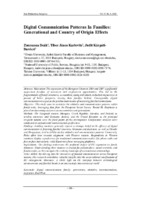Digital Communication Patterns In Families: Generational and Country of Origin Effects

Megtekintés/
Metaadat
Teljes megjelenítés
Link a dokumentumra való hivatkozáshoz:
Gyűjtemény
Absztrakt
Motivation: The expansion of the European Union in 2004 and 2007 significantly
augmented freedom of movement and employment opportunities. This led to the
fragmentation of family structures, as countless young individuals embarked on journeys in
pursuit of better prospects, leaving their families behind. Consequently, digital
communication emerged as the predominant means of sustaining familial connections.
Objective: This study aims to scrutinize the attitudes and communication patterns within
family units, leveraging data from the European Social Survey, Round 10. Emphasis is
placed on discerning variances across countries and generations.
Methods: The Visegrad4 nations (Hungary, Czech Republic, Slovakia, and Poland) as
sending countries, and Germany, Austria, and the United Kingdom as the principal
recipient nations were the focal points of this investigation. Comparative analyses were
conducted on attitudes and communication preferences.
Findings: Sending countries generally express a stronger belief in the efficacy of digital
communication in fostering familial closeness. Germans and Austrians, as well as Slovaks
and Hungarians, tend to exhibit similar attitudes and communication patterns. Conversely,
Poles often lean towards alignment with Western nations. Respondents in Western
countries display a preference for traditional communication modes like phone calls and
face-to-face interactions, while Easterners favor messaging platforms.
Implications: Our findings underscore the profound impact of EU expansion on family
dynamics. Understanding these nuances is crucial for policymakers, social scientists, and
families alike, as they navigate the evolving landscape of transnational relationships.
Value Added: By delving into the intricacies of familial communication across European
nations, this research contributes valuable insights into the socio-cultural ramifications of
EU enlargement. Moreover, it sheds light on the interplay between technological
advancements and familial bonds in an increasingly interconnected world.
- Cím és alcím
- Digital Communication Patterns In Families: Generational and Country of Origin Effects
- Szerző
- Deák, Zsuzsanna
- Karlovitz, Tibor János
- Kárpáti- Daróczi, Judit
- Megjelenés ideje
- 2024
- Hozzáférés szintje
- Open access
- ISSN, e-ISSN
- 1785-8860
- Nyelv
- en
- Terjedelem
- 21 p.
- Tárgyszó
- digital communication, family, generations, attitudes, transnationalism, migration, East-West
- Változat
- Kiadói változat
- Egyéb azonosítók
- DOI: 10.12700/APH.21.8.2024.8.16
- A cikket/könyvrészletet tartalmazó dokumentum címe
- Acta Polytechnica Hungarica
- A forrás folyóirat éve
- 2024
- A forrás folyóirat évfolyama
- 21. évf.
- A forrás folyóirat száma
- 8. sz.
- Műfaj
- Tudományos cikk
- Tudományterület
- Társadalomtudományok - szociológiai tudományok
- Egyetem
- Óbudai Egyetem
